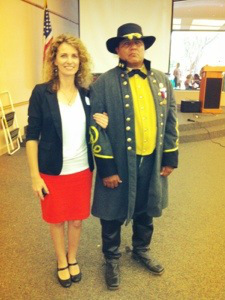Cara Brookins's Blog, page 13
May 12, 2013
Library Festival Done Right
The people of Harlingen, Texas know how to support a library book festival! This pre-launch discussion of Timeshifters, Mark of the Centipede was awesome! The organizers were generous, hard-working, book-loving people who made me feel perfectly welcome and at home. Speaking to a crowd of new people is always open to unknowns, and I decided at the last minute to change topics because we had more adults than teens. The audience was attentive, kind, and ready to discuss and ask questions. I count them all as new friends! You can spot some of them wearing Timeshifters tattoos and paracord survival bracelets.
That unscheduled fun I was planning to schedule? It found me in the form of South Padre Island. Salty air, sandy toes, and deep lazy breathing that went all the way through my soul. With a belly full of grilled shrimp, I’m wishing I had more time to spend in this beautiful part of Texas. If you have a chance to visit, stop by the library and give them your support. This is a community focused on education and literature. Bravo and Thank you, Harlingen!

May 11, 2013
Unscheduled Fun- Schedule Some!
May 14th is the official release of Timeshifters, Mark of the Centipede. That’s next week! I have been waking up in the middle of the night running through todo lists and interrupting my own throught interruptions with bulleted lists of layered interruptions. What I mean to say is, I’ve been (happily) busy. Last weekend I was applying promo tattos at the Oklahoma Writers’ conference by Oklahoma City. This weekend I’m flying to the Harrlingen, Texas Book Festival to share some promotional freebies and talk about the Timeshifters trilogy and other writing projects.
Attending a festival is just the thing I needed. Festival=fun. And that is something writers sometimes forget about. In all my lists of layered lists (multi-dimentional arrays if you’re a real geek) I fail to pencil in adequate time for fun. That sort of thing just has to happen by accident, and that’s a shame. In order to write about quality experiences, writers need to participate in all aspects of life. While that’s tough for book worms who savor quiet time, I challenge you to put some fun on your calendar every week. No, it doesn’t count if you call it research and take your notebook. Live the moment. Lose the analytical writer brain for a while. Pretend you’re mostly normal and have FUN!
Yes, I’m fully aware of the irony that I’m promoting fun when I’m obviously on a working/fun trip. But I’ve left some notebook free time to see a part of Texas that is new to me and to kick back without any lists. It’s as much of a challenge for me as it is for any writer. I’ll let you know how I do.

April 18, 2013
Sometimes the Treasure is Larger Than the X Implies
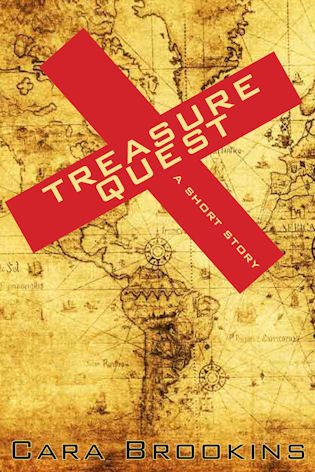 Buy now for .99 or select for free with Amazon Prime!
Buy now for .99 or select for free with Amazon Prime!
When I started writing Treasure Quest, my knowledge of Civil War history was pretty dismal. With thousands of Civil War experts out there, finding details about battles, clothing, and weapons was simple. But what I enjoyed more was finding my way into the minds of the average person during those extraordinary times.
We still have difficulty understanding the complexities of the war that had brother fighting against brother—both with the stubborn declaration that they fought for, not against, the freedom and ideals of our young country. What interests me most are the stories of typical families during this time period. How did they survive? What was most important? What did they dream about? How did they deal with the loss and devastation of family and property? Cooper’s story uncovers not only the known history, but the artifacts and treasures that are yet undiscovered. Some of these are tangible objects while others are memories, stories, and family legacy more valuable than any rare coin or gem.
This short story was so much fun to write that I’ve considered writing a novel about Cooper’s next treasure hunt with his dad and great-grandfather. Exploring lost treasures and family stories during the Civil War offers endless adventure and touch of tragedy. I hope Cooper digs up trunk loads of both the tangible and intangible sorts of treasure.
This short is available now with a bonus of three free chapters from Timeshifters, Mark of the Centipede. This first Journey in the Timeshifters trilogy will be available on May 14, 2013. Get a sneak peek at this exciting new time travel adventure trilogy! Timeshifters Books
Cooper would rather spend the summer playing the latest Zombie Civil War Style video game than with his ailing great-grandfather, Orson. But when Orson’s Civil War stories reveal a treasure buried near his home in Pea Ridge Arkansas, Cooper not only pays attention–he gets involved.
An ancient map and journal lead Copper to the same spot in the forest where dozens of people have searched for the legendary treasure. Cooper is trapped by a ferocious dog and forced to fight for his life while he tries to uncover the mystery and locate the treasure that is unlike anything he ever imagined. Buy now for only .99, or select free with Amazon Prime!

April 14, 2013
Rules? What Rules?

What Rules?
This week I presented to a high school creative writing class about the process of publishing. Because my Timeshifters trilogy is launching in a few weeks, it was the perfect time to step away from the last-minute chaos and focus on the point of this entire process—the readers.
So much to share. When I speak to a group of very young, new writers, I always worry that I will run out of things to say. I should know better. Once I begin describing process from the first wiggle of an idea to the frantic trails of research and all the way to inhaling deep over a box of freshly printed books, I can’t find a stopping point. I’m reminded that writing isn’t merely the thing that steals away my sleeping time and socializing hours. It isn’t an endless stream of deadlines, frustrations, and rejections… well… okay it is all those things, but it is also the very thing I live for and cannot live without.
Passion shows. I have hundreds of interests. I want to try everything, see everything, and learn everything. I can hold my end on conversations on an incredibly large number of topics at a fairly high level. But nothing makes me feel as giddy as talking about writing. And when I see that passion mirrored back in the eager eyes of young people, nothing could make me more determined to be the best writer I can be.
Lessons re-learned. High School writers ask high quality, intelligent questions about every stage of the writer process. They are energetic at 8:00am even without coffee. Their dreams are fragile and uncertain. And they are forming long-standing habits that will shape their future. In short, they are exactly like older, more experienced writers except for the part about not needing coffee to stand upright before noon. (Which is slightly infuriating.)
Things that made me smile. When I asked, “what are you reading?” Someone pulled out a book. Some were reading more than one. Too often I hear adults say, “I haven’t read a book in years.” It was refreshing to see dog-eared books waving in the air. And the fact that they had paper books was surprising, too. My adult friends have gone all digital. Who would have thought adults would be ahead of teens on any scale with technology? It seems that this group of teenagers was slow to pick ebooks over the old-fashioned kind. Whatever the format, they agree with me that books are as essential as oxygen.
What rules? These young people have something that gives them a boost over many adult writers. They are uninhibited. They don’t feel locked in by genre rules. Not even their inexperience in life situations stops them from writing about a complex idea they love. They haven’t been rejected enough to feel cautious. They just leap ahead, convinced they can succeed because they have been told they can do anything–and they still believe it.
What they gave me. While I’ve always been eager to try new things, I’ll admit that I have aimed more often toward the safe paths. I’ve been rejected often enough to avoid the long shots, even when they are what I really want. Today I feel newly inspired to charge forward uninhibited with my hands in the air and my imagination in the clouds. I’m going to live like there is no tomorrow and write like there are no rules today.

March 31, 2013
The Shift is About to Hit the Fan!
Weeks away from the launch of a new Timeshifters trilogy, my time for writing new things is stolen away by a project I declared “complete” long ago. And declaring a project complete is not something I take lightly. I fight it with “just one more edit” and “I’m letting it rest before I read it a final time” until I reach a place where I can no longer be objective and frankly want to puke if I have to read the stack of papers one more time. Even then, I walk away from a loved story with two careful steps forward and one long step back until a new idea drives me to embrace the next novel.
No matter how much I love the process of writing, I don’t write merely because the stories will claw a hole in my head if I don’t let them out. I write because I want to share those insistent stories with other people. I write to be read. So naturally I’m excited beyond words for Timeshifters: Mark of the Centipede to meet the world. I can’t wait for other people to follow the amazing journey that sent Jordan Booker to a mysterious ancient past.
Still, with book signings, school appearances, writing groups, conferences, blogs, Facebook connections, Facebook author pages, webpages, merchandise acquisition, sales, and so on, when will I find time to let the next story out of my head before it creates the afore mentioned hole in my skull?
Jordan’s tale is all about survival. And I can’t help but apply the same survival lessons to my writing and promotion process while I travel the crooked path to the bookstores.
Keep your eyes on what’s important. Jordan learned that his little sister Jada was his top priority, but he also learned that he sometimes had to travel dangerously far from her in order to secure her future. He learned about balance. It simply isn’t possible for me to work on the latest new novel every day when I have the day job, kids, the house, hobbies, friends, and promotions to tackle. So in this case, balance isn’t about carving smaller but equal bits of time for each thing on the list. Instead, it’s about alternating which of the list items should go on ice at the moment. Sometimes, giving myself permission to step away for a little while creates exactly the right balance. Promotions this week—decadent writing time to follow.
Finish what you start. Jordan’s story is told in three books, each one with a unique journey to a different time in ancient—previously unrecorded—history. His first journey was filled with injury, fear, mistakes, and uncertainty. Making the decision to carry on with the next journey took a lot of courage. Jordan realized he had to meet his obligations even if it was difficult. When I wrote the first draft of this manuscript many of the characters, who later became my favorite, didn’t even exist. The story took several years and an embarrassing number of drafts before I declared it complete. Even then the work wasn’t done. If I believe the story is worth telling, then it is my obligation to follow through with the same commitment of time, energy, and determination to promote the trilogy until it reaches a wide audience. I intend to see this thing through even while the next story is knocking at the parietale region of my skull.
Never stop dreaming. Anything is possible. Jordan’s personal goal of keeping his sister safe and keeping his family together is his first motivator. He dreams of a better life for them. But what ultimately pushes him forward is his dream for a better future for all of mankind. When he discovers that the past is different than anything he ever imagined, he believes that the future can be even better than anyone has yet conceived. Like Jordan, I have personal goals that push me to stay up late for one last edit or attend one more event. But ultimately my most important goals are the grander ideas that I want to share with a wider audience. They are the dreams to make the world a better place by sharing stories, ideas, and lessons hard learned in my life. I honestly believe that anything is possible, and I hope my stories spark that belief in readers.
So when the shift hits the fan, you’ll find me focusing on the cool air rather than the stinky stuff. I’ll be relentlessly pushing forward until I realize one dream and conceive of the next.
Timeshifters: Mark of the Centipede. May 14, 2013 — This shift’s for real!
Like Timeshifters Books on Facebook! https://www.facebook.com/TimeshiftersBooks

January 18, 2013
Wellness- Hoop It Up!

Writer Wellness at Buzz Books!
Check out my hooping blog on the Buzz Books site, and sign a wellness pledge! Writers have some creative ways to keep moving, what’s yours?
I’m a hooper. Learn more (and see a couple pics) at: http://buzzbooksusa.com/ #WriterWellness Author Cara Brookins Hoops It Up

October 19, 2012
Focus.Right=Focus.Write

Home Library
My last blog prompted several writers to ask about my personal writing process, specifically, tips for optimizing writing time by focusing their writing from the moment they sit down with pen or keyboard each day. Because so many writers face extreme time deficits while balancing the day job, family, housework, writing, and promotion, the topic is probably on our minds every day. Most likely, bad language is often attached to the thought.
I am a list maker and an efficiency nut. I don’t relax well and don’t feel like I’m operating at an optimal rate unless I am doing three or four things at a time. I listen to audio books in double speed. (Seriously, I do.) And I panic if I don’t have enough podcasts queued up for the commute home. At the office, I have three monitors and am coding in different languages on each of them. The danger in this sort of efficiency hounding is that in trying to do so many things at once, none of them are earning your full focus. The other danger is in losing one’s mind completely, but that is another blog… likely one I am writing simultaneously with the toes of my left foot.
It is impossible to write a novel without devoting one hundred percent of your mind to it. Better add one hundred percent of the subconscious mind as well as all the fingers and toes. If you attempt to write a novel while checking the Facebook news stream, answering emails to your aunt, and reading a fairytale to a sleepy child, don’t bother checking the best seller list for your name.
My life schedule dictates that I write at night. So I land in the writing chair with a full day’s worth of baggage and a limited amount of keyboard time before I start to drift or outright doze. Here are the methods that have made me a rather prolific writer despite the chaos of my day life. I hope some work for you, and if you have alternate suggestions, share. We’ve already established that I’m willing to try them all simultaneously.
Having a physical place set aside that is a writing place is my first step. For me, this is my home library. If the kids are around and I’m out of duct tape, I turn on the Pandora radio station that I’ve created specifically for the current manuscript and stuff a towel under the door. Next, I have strict rules for myself: turn off the phone, email, and internet. Yes, this includes Facebook, Twitter, LinkedIn, GoodReads and anything I try to get away with in the name of writing promotions. This also includes communications with editors/agents/writing buddies. Those are not handled during writing time.
The next rule is the most important. As soon as I sit down, I start to write. If I can’t launch directly into the novel where I left off, then I pull up a notes document and begin writing. This is informal and goes something like:
My protagonist is hiding in the forest listening for anyone who might be following. Maybe someone is following but it is his sister, or the girlfriend or something like that. No, that sucks. Maybe no one is there and his paranoia is increasing. It doesn’t matter if anyone is really there or not. Need to amp up the tension because he believes they are. And what about Sammy? Does he fit in this scene? Oh, Perfect. So Sammy is the one he hears in the forest, but Sammy claims he was already there, claims he thought protagonist was following him. Now who is paranoid? It’s been a while since we heard from Big Bully too. What the heck is he up to? He was crying in his beer last I remember. He should be up to something wicked next. Should puppies be involved? His children? Parents? Maybe he is cruel even to himself. No, who cares if he hurts himself…boring…
After a page of this rambling my plot is sorted and solid and I’m ready to pick up where I left off. Either that or I just get tired of my own rambling and begin writing to escape.
Another thing I do is dictate voice notes on my way to the office in the morning. I sort things out much like the above, often with more questions than answers. Then before I sit down to write, while I’m doing the evening dishes and rubbing the cat’s belly with my toes, I listen to 10 minutes of my own rambling about the plot. Some days this is enough to launch me directly into the writing. Other times I’ve used meditation and fifteen minutes with my massage chair, Ivan, to clean the useless junk from my mind.
If all else fails, I wear my lucky writing socks and spin my office chair three times to the left at the end of each paragraph. While this can be effective, you should get a solid location on the cat before the spinning begins, thus eliminating excess noise that is sure to break your concentration and enrage the kids.

October 12, 2012
The Tease of Something New
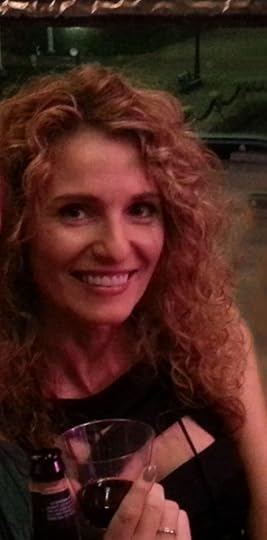
Cara Brookins – Bouchercon 2012
I’ve got that feeling again. I should have seen it coming. Doesn’t it always come when I’m in the middle of several long-term projects and don’t have a spare minute to let the brain cells cool? Of course it does. It lies in wait and then launches at me like Hobbes the tiger tackling little Calvin no matter how carefully he sneaks in the back door.
I want to start a new project. A brand new sparkling clean novel. Maybe a full series. Oh, the ideas are endless, beautiful, sparkly things. I want them. The idea of opening a new word document and spilling words across the page makes my fingers itch and my heart race.
A new project always sounds tantalizing, but never so much as when I simply can’t have it. My muse is a genuine tease. And while the idea of abandoning everything for the love of the new work of art is quite romantic, it is neither possible nor wise. In addition to the day job taking up an unfair amount of time and the kids demanding food and shelter, I’m in the middle of a contract for a young adult trilogy and I have two adult manuscripts to market. I’m trying to convince myself that if I can bottle up this creative energy it will make that new project even better when the calendar clears. I’m confident that my Calvin-ish muse will be waiting to launch into a rolling tackle, and since I’ll be relaxed and limber minded, I’ll be less prone to injury.
To be honest, the restless mood had some fuel. I just returned from Bouchercon. If you’ve attended, then you know. If you haven’t, then attend next year. While every conference sends me home feeling inspired, validated, and more connected, Bouchercon took it all to a higher level. Top notch writers from around the world and the best fans in the world gather to talk about books. Can you imagine anything better? Probably not, but it was. You have to factor in the Rock and Roll Hall of Fame, The House of Blues, the Map Room, the Renaissance Hotel bar, and a dozen Cleveland restaurants, museums, and shopping spots. Next year we’ll be in Albany. Book early before registration closes down or the hotels fill. Just be prepared for your eyes to glaze over with plots and the restless desire to chase shiny new projects. Bouchercon 2013. Still not convinced? View a partial list of the authors and fans who attended Bouchercon 2012.
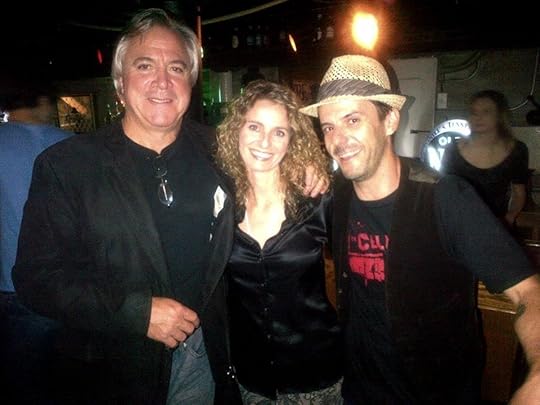
Pete Morin, Cara Brookins, Ro Cuzon
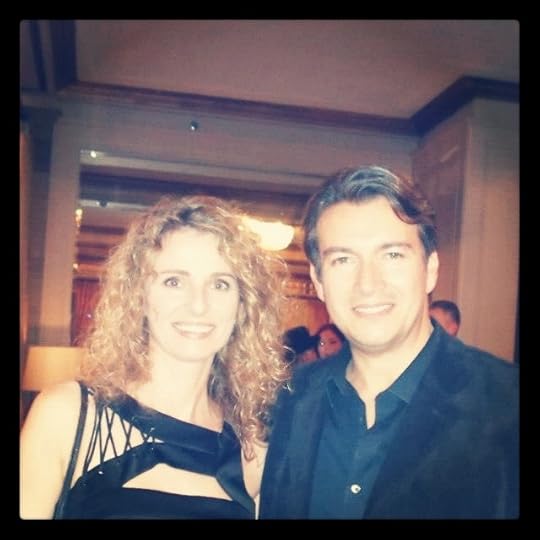
Cara Brookins & Andre Frieden
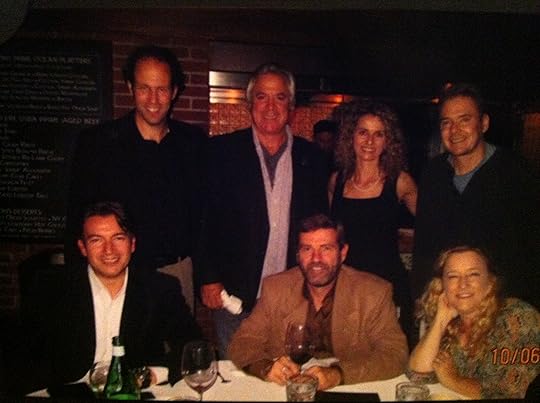
Brad Parks, Pete Morin, Cara Brookins, Eric Christopherson, Andre Frieden, David Douglas, Valerie Douglas
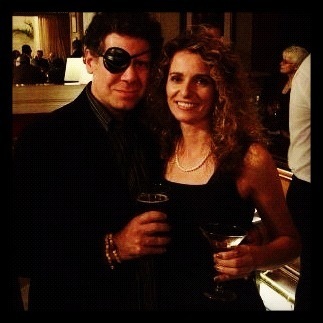
Sean Chercover & Cara Brookins

August 26, 2012
Interview with Garry Craig Powell
Stoning the Devil, by Garry Craig Powell is available now!
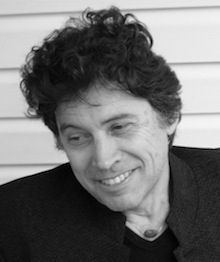
Garry Craig Powell – Stoning the Devil
Cara Brookins: Thanks for talking to me about your first published book, Stoning the Devil, Garry. When did it come out?
Garry Craig Powell: Last Monday, August 20.
Cara Brookins: It’s published by an English house, isn’t it?
Garry Craig Powell: Yes, the incredible Skylight Press.
Cara Brookins: Why did you decide to publish with an English press?
Garry Craig Powell: A lot of American publishing houses came close to taking it; they said the writing was brilliant, but they didn’t think it was commercial enough. They thought the characters weren’t sympathetic, or it was too bleak. So I tried the English publishers, and Skylight picked it up at once. English publishers are bolder than American ones, and Skylight is a particularly bold, imaginative press, bringing out tremendously exciting work. They aren’t publishing formula fiction. They’ve got a stable of innovative, wild poets, novelists and esoteric writers, soon-to-be big names like Kirk Marshall, Chris Hill, Dee Sunshine, and Peregrin Wildoak. Some already famous names too, like Rikki Ducornet and Iain Sinclair.
Cara Brookins: Can you tell us about the genesis of the book? When did you get the idea for it?
Garry Craig Powell: From 1993 to 1998 I taught on the Women’s Campus of the United Arab Emirates University in Al Ain, and I heard so many astonishing stories, often from the mouths of my students, who were surprisingly open, that I knew I would have to write about them one day.
Cara Brookins: But you didn’t right away?
Garry Craig Powell: No. My first marriage was in ruins for that whole period, and it was all I could do to survive. That’s not quite true. In 1997 I wrote an early draft of “Kamila’s Price,” which ended up in the book, but that first draft was very different from the final version.
Cara Brookins: How so?
Garry Craig Powell: I made the beginner’s mistake of overdoing the melodrama. I had Colin, the Englishman, caught in flagrante with Kamila, the Polish girl, by her pimp—but Colin was penniless, and the pimp, who was Jewish, decides to circumcise Colin with no anesthetic as a punishment. It makes me laugh to think of it now. It ended up considerably more subtle.
Cara Brookins: So you started writing the book about fifteen years ago?
Garry Craig Powell: Not really. When I was in graduate school at the University of Arizona, I did write “Unveiled”, which is also in the book, in close to its present form, but for several years after that I labored on an autobiographical coming-of-age novel set in Spain, which wasn’t very good.
Cara Brookins: When and why did you start writing Stoning the Devil, then?
Garry Craig Powell: It was about 2004. I’d had no success with the Spanish novel, and I’d been meaning for years to write some stories set in the UAE, and suddenly I had the idea of writing a linked sequence. I wanted to have characters recurring in different stories. I already had two, and I found it easy to come up with more.
Cara Brookins: But why the UAE? What attracted you to writing about the Middle East?
Garry Craig Powell: First of all, it was exotic, intrinsically fascinating, a place of incredible contrasts, desert and camel markets and mud forts and oases on the one hand, night clubs, skyscrapers and sports cars on the other. Second, apart from a couple of good Arab writers—Hanan Al-Shaykh and Abdulrahman Munif—almost no one had written fiction about the Gulf. The only westerner I had come across was Hilary Mantel, who wrote a pretty good novel in the eighties called “Eight Months on Ghazzah Street”. But by 2004 I’d lived in the UAE for eight years, much longer than Mantel, and I thought I understood the people and their customs better. So in a sense there was a sort of ethnographic intent. But the book is much more than a fictionalization of a picturesque way of life.
Cara Brookins: What do you mean? Apart from the romantic setting, what else attracted you to the Middle East?
Garry Craig Powell: Let’s not underestimate the romantic setting. Lawrence of Arabia was the first film I was deeply moved by, at the age of seven—that’s true of Colin, too, in the book. Images of Lawrence nobly fighting for Arab freedom remained with me for decades. But apart from that, I was shocked when I got there by the vulgarity of the way of the life—the materialism, the hedonism. You find that in all capitalist societies, but it’s particularly evident in the Gulf. And it seemed to me that because of all the wealth, because of the newness of the cities and the ease of access to all sorts of pleasures that Gulf Arabs and western expats have, many, many of them behaved very badly. I noticed how much drunkenness and debauchery there was, how many marriages collapsed—often very nastily too, like mine. I wasn’t judging people. I behaved terribly too, and that was the worst shock of all. I’d always thought of myself as a good person, and here I was, acting in ways I was ashamed of. And I realized that most of the awful people probably thought of themselves as good, decent people, or at least had done so once. So I wanted to explore how they changed. I started writing stories about adults losing their innocence.
Cara Brookins: There’s a lot of sex in the book, isn’t there? Pretty much every story! Why is that?
Garry Craig Powell: It’s because sex is such an important part of human behavior; it’s a reliable barometer of the power dynamics in a relationship. In a region where, on the whole, women are oppressed and repressed, it’s inevitable that men take advantage of them. And I tried to show that that isn’t only true of the Arabs. A lot of the westerners behave in more traditional, macho ways too. It’s as if the conservative culture gives them an excuse.
Cara Brookins: Is that why so much of the sex is kind of nasty? A lot of it is violent, or abusive, or obsessive, isn’t it?
Garry Craig Powell: Yes.
Cara Brookins: Are you saying that sex is always unhealthy in the Middle East?
Garry Craig Powell: Of course not. Remember, I’m not writing a sociological study, this is a work of fiction. I’m just writing about a small group of characters. Fiction writers tend to take more extreme cases, because the average and the unremarkable are not all that interesting. Obviously there are happily married couples in the Middle East, Muslims and westerners and others. But my group of characters are all people who are looking for love in the wrong places, as the cliché goes. Most of them are actually looking for love, too, rather desperately—but end up settling for lust. And through the tangled skein of their relationships, the reader learns a lot about the dynamics of the culture between the different ethnic groups, especially the local Gulf Arabs, the more westernized northern Arabs of Lebanon and Palestine, and the westerners.
Cara Brookins: There isn’t really a single main character or a single plot, is there?
Garry Craig Powell: No, you’re exactly right. There are several plots of almost equal weight. If anything, the Colin-Fayruz plot is the most central. But the other storylines with which it’s interwoven are probably as important. It ended up being more than a linked sequence of stories. I think of it as a novel-in-stories, like Jennifer Egan’s Visit from the Goon Squad or Tim O’Brien’s The Things They Carried. It has that kind of scope, that kind of ambition, and I hope, that kind of coherence.
Cara Brookins: Oh, I agree. I think it’s up there with them in quality too.
Garry Craig Powell: Thank you!
Cara Brookins: Stoning the Devil has already attracted high praise from some well-known writers, like Naomi Shihab Nye and George Singleton. You must be very pleased.
Garry Craig Powell: I’m delighted and flattered. Naomi is not only a brilliant writer but one of the noblest, kindest human beings I’ve ever met, and George is certainly the funniest raconteur I’ve come across. I was very honored to get the advance praise from them.
Cara Brookins: Naomi Shihab Nye says that the book is a “mesmerizing read” and adds “Garry Craig Powell has an astonishing ability to create characters with swift and haunting power.” Can you tell us something about those characters?
Garry Craig Powell: At the center there’s Colin, an English professor who used to be an aid worker. He is an Arabist, imagines himself to be progressive, but has some latent racism that he’s unaware of, at least in the beginning. He’s unhappily married to Fayruz, who is a traumatized survivor of the massacres by Christians and Israelis of the Palestinian refugee camps outside Beirut in the early eighties. Fayruz’ brother, Marwan, is a banker, and like Colin, a womanizer. He’s married to Randa, another Palestinian refugee. These are sophisticated, western-educated Arabs. They all traumatized by war, but there’s some dark humor in their relationships, particularly in the Marwan-Randa strand. Then there are other characters connected to Colin: a young Polish girl called Kamila who is down on her luck, and two of his Emirati students at the university, Badria and Alia, who are cousins and best friends, but have a very bizarre relationship. There’s a Sri Lankan masseur called Tyrone—
Cara Brookins: Tyrone! Like the actor Tyrone Power?
Garry Craig Powell: Yes, quite a few Sri Lankans have English names. A famous cricket captain from the country was called Tyrone, in fact. And there are some Emirati men, too: Sultan, Badria’s brother, who gets involved in different ways with Kamila and Alia, and Khalifa, who has a connection to Randa.
Cara Brookins: You said some of the American publishers thought the characters too unsympathetic. Do you think that novels need characters that readers can identify with? Do we have to like them? And which are your favorite characters?
Garry Craig Powell: I don’t think that readers have to like the characters. Look at Raskolnikov in Crime and Punishment. Or Meursault in The Stranger. You wouldn’t want to go out for a beer with either of those guys. But they’re fascinating. Why? Because they’re wrestling with real ethical problems. They might not be as nice as we’d like, but we understand what they want, and when they clash with society, we want them to learn from their mistakes. Flawed characters are more fascinating than anodyne, nice ones. At any rate I will follow a character on a difficult journey as long as I can understand him or her, as long as they are complex, compelling people.
Cara Brookins: You haven’t answered part of my question. Do you like your characters?
Garry Craig Powell: Actually, I do, though not one of them is wholly admirable. I feel I understand them, and as the French say, tout comprendre, c’est tout pardonner.
Cara Brookins: You can forgive Sultan and his father?
Garry Craig Powell: Maybe not them! Though obviously they have been brutalized—Sultan by his father, and his father, probably, by his own father.
Cara Brookins: Do have favorites?
Garry Craig Powell: I do. I’m especially fond of Randa, who starts out so weak and submissive, but who struggles to find herself and become assertive. I like Badria too. Although she’s manipulative and even cruel, she’s incredibly strong. She’s learned how to survive and even thrive in a hostile environment for women. She reinvents herself, and she’s instrumental in helping Randa reinvent herself too. I must say too that I have great sympathy for Kamila. She may appear weak, and she suffers horribly, but by God, she puts up a fight at the end. And it’s her courage that redeems her, I think. I’m also very fond of Tyrone, the wise, kind, Buddhist man who gives massages to spoilt, rich expats and Arabs.
Cara Brookins: Was he based on a real person? Were all the characters?
Garry Craig Powell: Not all of them, no. Some were based on people I knew quite well—rarely a single person, usually composites of several people—some were based on people I’d heard of or read little snippets about in newspapers, and some were entirely made up. But Tyrone was based on a wonderful man I knew.
Cara Brookins: Did he impart Buddhist wisdom to you on the massage table?
Garry Craig Powell: You may laugh, but he did indeed.
Cara Brookins: Are you Colin? I read a review that said he might be your alter ego.
Garry Craig Powell: That’s the question I dread! Naturally the reader notices some resemblances—English, professor, Cambridge-educated, lived in the UAE—but there are some big differences. I was never an aid worker, I never had an Arab wife (though I’ve heard there’s a rumor at the university that I once had a mail-order Arab wife!), I’ve never taught literature, never slept with a prostitute, or done a lot of the things that Colin does in the book. Nevertheless, of course there’s a lot of me in him, as there is in all my characters. You project parts of your personality into your characters, sometimes the worst, most frightening thoughts and impulses.
Cara Brookins: Sounds scary.
Garry Craig Powell: As Naomi Shihab Nye said, it’s a “journey to the dark side of human behavior.” It has to be. If you just write about happy people having fun, there’s no story.
Cara Brookins: Naomi Shihab Nye also said, “You will not be able to put this book down.”
Garry Craig Powell: I hope she’s right! Burn the midnight oil!
Cara Brookins: And George Singleton, who also said the book is “mesmerizing”—curious that they both use that word—compared your sensibility to “the best Conrad, Kipling, Orwell and Achebe.” Does that comparison frighten you?
Garry Craig Powell: It humbles me. Of course I aspire to be in those ranks—every writer worth his or her salt aspires to be among the best, as John Gardner said. And there’s no question that my themes echo theirs: I’m writing about the problems caused by colonialism, the evils that arise when one group of people tries to dominate or exploit another. But posterity will have to decide whether I belong in such exalted company.
Cara Brookins: There’s no question that Stoning the Devil deserves to be very popular.
Garry Craig Powell: Thank you very much, Cara.
Cara Brookins: And thank you very much for talking to me, Garry. Just one last question: where can readers buy the book? And are you giving readings in this area?
Garry Craig Powell: You can get it from Amazon; $15.99 for the paperback, $7.99 for the e-book. A lot of people have been downloading it! You can also buy it directly from the publisher, Skylight Press, or order it from a bookstore. I’ll be doing a book-signing at Hastings in Conway on September 15, and a meet-the-author event at Faulkner County Library in Conway on September 30. I’m giving a reading at Faulkner County Library on November 1. There will be other events too. Anyone is interested should check out my website, http://garrycraigpowell.com, which has a page for Appearances, or my Facebook fan page, Garry Craig Powell, Writer. Just “like” it, and you’ll get the update.
Cara Brookins: Thanks again, Garry.
Garry Craig Powell: Shukran, Cara.
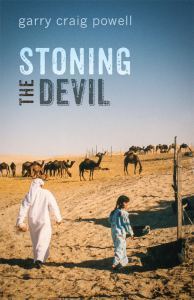
Stoning the Devil – Garry Craig Powell

August 21, 2012
Stoning the Devil – Garry Craig Powell
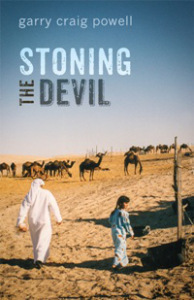
Stoning The Devil – Garry Craig Powell
Stoning the Devil, was released this week by Skylight Press. The talented author, Garry Craig Powell, will pull you in with the unique setting and characters, and then he’ll keep you there to hear the full, compelling story. You will come away with a clear picture of the complexities both men and women face in the United Arab Emirates. But more than that, you will understand more about the darkness and the light of human nature. Perhaps, you will better understand yourself.
Come back for my next post, an interview with the author. For more info, and accounts of his own experiences living in the United Arab Emirates, visit Garry’s blog.
Buy your digital or paper copy on Amazon today! Stoning The Devil.
Stoning the Devil is a novel-in-stories set in the United Arab Emirates, a country of paradoxes, of seediness and glamour, of desert grandeur and Disneyland vulgarity, where public executions and other barbaric customs are winked at by the western expats who run the economy. Colin, a professor of literature, is not the ‘typical’ expat, ignorant and interested only in pleasure and his stock portfolio, but a speaker of Arabic and an admirer of Arab culture – or is he? To his Arab wife, he is an Orientalist who exoticizes and patronises the locals, unaware of his latent racism. Powell presents a complex and contradictory set of Arab characters, who are a far cry from fundamentalist stereotypes. He also gives women in the Gulf a voice – as none are completely submissive.
This powerful novel-in-stories is probably the first work of literary fiction set in the Persian Gulf by a westerner since Hilary Mantel’s Eight Months on Ghazzah Street. It echoes all the concerns of the great Arab writers, Mahfouz, Munif, and Kanafani, regarding the post-colonial world. Written by an author who spent eight years in that part of the world, the Gulf is presented as a crucible in which people of different races and religions are forging a new humanity, in spite of the abysses between them.


